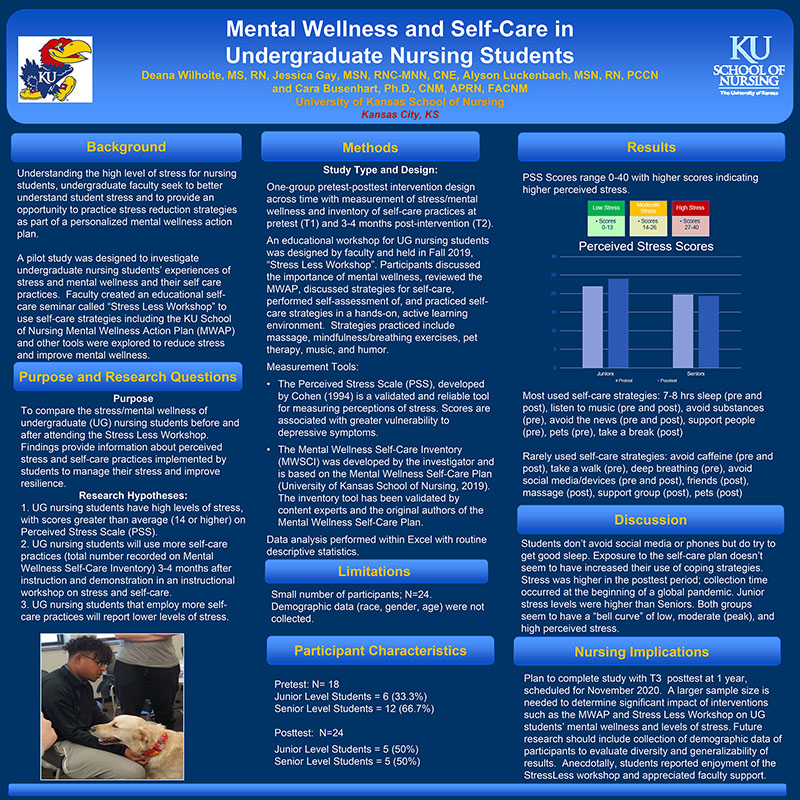
Hover to pan and click to magnify. Click again to pan at full screen.
Deana Wilhoite, MS, RN, Jessica Gay, MSN, RNC-MNN, CNE, Alyson Luckenbach, MSN, RN, PCCN, and Cara Busenhart, Ph.D., CNM, APRN, FACNM
Deana Wilhoite, MS, RN, Jessica Gay, MSN, RNC-MNN, CNE, Alyson Luckenbach, MSN, RN, PCCN, and Cara Busenhart, Ph.D., CNM, APRN, FACNM
KU School of Nursing
Background
Understanding the high level of stress for nursing students, undergraduate faculty seek to better understand student stress and to provide an opportunity to practice stress reduction strategies as part of a personalized mental wellness action plan.
A pilot study was designed to investigate undergraduate nursing students’ experiences of stress and mental wellness and their self care practices. Faculty created an educational self-care seminar called “Stress Less Workshop” to use self-care strategies including the KU School of Nursing Mental Wellness Action Plan (MWAP) and other tools were explored to reduce stress and improve mental wellness.
Purpose and Research Questions
Purpose
To compare the stress/mental wellness of undergraduate (UG) nursing students before and after attending the Stress Less Workshop. Findings provide information about perceived stress and self-care practices implemented by students to manage their stress and improve resilience.
Research Hypotheses:
1. UG nursing students have high levels of stress, with scores greater than average (14 or higher) on Perceived Stress Scale (PSS).
2. UG nursing students will use more self-care practices (total number recorded on Mental Wellness Self-Care Inventory) 3-4 months after instruction and demonstration in an instructional workshop on stress and self-care.
3. UG nursing students that employ more self-care practices will report lower levels of stress.
Methods
Study Type and Design:
One-group pretest-posttest intervention design across time with measurement of stress/mental wellness and inventory of self-care practices at pretest (T1) and 3-4 months post-intervention (T2).
An educational workshop for UG nursing students was designed by faculty and held in Fall 2019,
“Stress Less Workshop”. Participants discussed the importance of mental wellness, reviewed the MWAP, discussed strategies for self-care, performed self-assessment of, and practiced self-care strategies in a hands-on, active learning environment. Strategies practiced include massage, mindfulness/breathing exercises, pet therapy, music, and humor.
Measurement Tools:
• The Perceived Stress Scale (PSS), developed by Cohen (1994) is a validated and reliable tool for measuring perceptions of stress. Scores are associated with greater vulnerability to depressive symptoms.
• The Mental Wellness Self-Care Inventory
(MWSCI) was developed by the investigator and is based on the Mental Wellness Self-Care Plan (University of Kansas School of Nursing, 2019). The inventory tool has been validated by content experts and the original authors of the Mental Wellness Self-Care Plan.
Data analysis performed within Excel with routine descriptive statistics.
Limitations
Small number of participants; N=24. Demographic data (race, gender, age) were not collected.
Participant Characteristics
Pretest: N= 18
Junior Level Students = 6 (33.3%) Senior Level Students = 12 (66.7%)
Posttest: N=24
Junior Level Students = 5 (50%) Senior Level Students = 5 (50%)
Results
(View poster)
Most used self-care strategies: 7-8 hrs sleep (pre and post), listen to music (pre and post), avoid substances
(pre), avoid the news (pre and post), support people
(pre), pets (pre), take a break (post)
Rarely used self-care strategies: avoid caffeine (pre and post), take a walk (pre), deep breathing (pre), avoid social media/devices (pre and post), friends (post), massage (post), support group (post), pets (post)
Discussion
Students don’t avoid social media or phones but do try to get good sleep. Exposure to the self-care plan doesn’t seem to have increased their use of coping strategies. Stress was higher in the posttest period; collection time occurred at the beginning of a global pandemic. Junior stress levels were higher than Seniors. Both groups seem to have a “bell curve” of low, moderate (peak), and high perceived stress.
Nursing Implications
Plan to complete study with T3 posttest at 1 year, scheduled for November 2020. A larger sample size is needed to determine significant impact of interventions such as the MWAP and Stress Less Workshop on UG students’ mental wellness and levels of stress. Future research should include collection of demographic data of participants to evaluate diversity and generalizability of results. Anecdotally, students reported enjoyment of the StressLess workshop and appreciated faculty support.

Present with Google Meet
Invite as many as 30 people, and present your poster in high definition. Transcription option is available. Free to use.
DISQUS COMMENTS WILL BE SHOWN ONLY WHEN YOUR SITE IS ONLINE